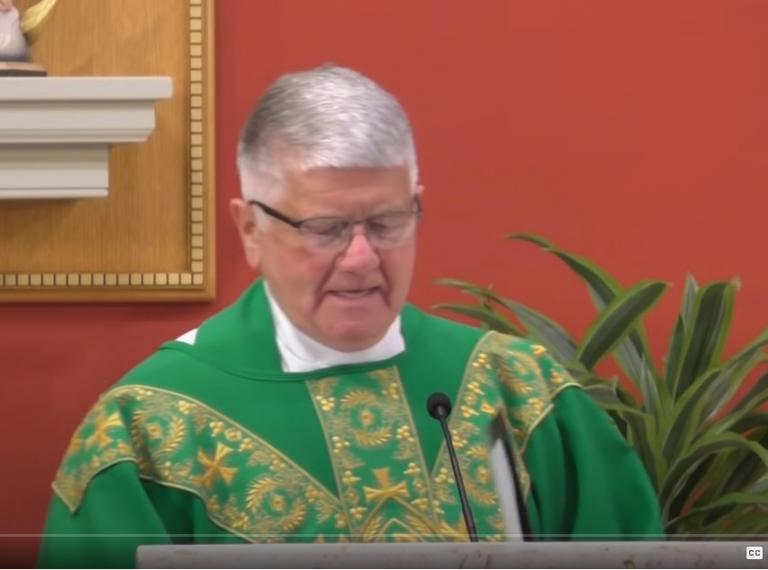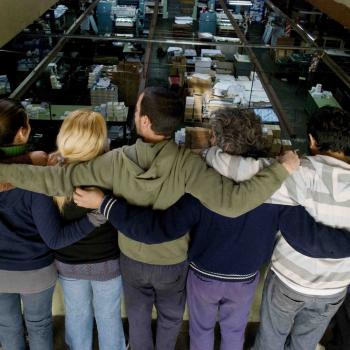
A political homily entitled “Staring into the Abyss” by Fr. Meeks has been floating around social media (over 2 million views on YouTube), and as it goes with these things, the priest is being heralded as a courageous hero by some who then try to use it to convince their political opponents that to be a real Catholic means to vote a certain way. For those who are doing their best to form their consciences according to the teachings of the Church, but come to a different political conclusion, these homilies are hurtful, disenfranchising, and damaging. The faithful are called to form their own conscience, and priests are instructed to help us by teaching us what the Church teaches, not by telling us what their conscience dictates we should do.
As a stay-at-home mom of 8, and life-long conservative, I have some thoughts.
Firstly, it should be said that a Catholic should not feel at home in either political party. Both parties are deeply flawed and neither of them encompasses the whole of the social obligation of our faith. I agree with Fr. Meeks that we must think with the Church, and to do so we must remember that the teachings of the Church, and the Pope’s in particular, address a global church. The teachings of the Church and the Pope’s words ought to be applied to our particular situation (in this case American politics), but their scope can not be limited to our situation or interpreted through a lens of American exceptionalism.
Secondly, his attempts to reduce the whole Catholic Social teaching to only three non-negotiables is damagingly simplistic. Fr. Meeks said his list is from the apostolic exhortation Sacramentum Caritatis. This is a beautiful document on the Eucharist out of which Fr. Meeks focuses on just one sentence from section 83.
- Here it is important to consider what the Synod Fathers described as eucharistic consistency, a quality which our lives are objectively called to embody. Worship pleasing to God can never be a purely private matter, without consequences for our relationships with others: it demands a public witness to our faith. Evidently, this is true for all the baptized, yet it is especially incumbent upon those who, by virtue of their social or political position, must make decisions regarding fundamental values, such as respect for human life, its defence from conception to natural death, the family built upon marriage between a man and a woman, the freedom to educate one’s children and the promotion of the common good in all its forms (230). These values are not negotiable. Consequently, Catholic politicians and legislators, conscious of their grave responsibility before society, must feel particularly bound, on the basis of a properly formed conscience, to introduce and support laws inspired by values grounded in human nature (231). There is an objective connection here with the Eucharist (cf. 1 Cor 11:27-29). Bishops are bound to reaffirm constantly these values as part of their responsibility to the flock entrusted to them (232).
The non-negotiables listed here encompass much more than Fr. Meeks communicated in his homily. The list is also different. Pope Benedict mentions four items that are not negotiable and none of them include the protection of religious liberty specifically.
In another address by Pope Benedict XVI to the members of the European People’s Party in 2006, he mentions these non-negotiables again.
As far as the Catholic Church is concerned, the principal focus of her interventions in the public arena is the protection and promotion of the dignity of the person, and she is thereby consciously drawing particular attention to principles which are not negotiable. Among these the following emerge clearly today:
- protection of life in all its stages, from the first moment of conception until natural death;
- recognition and promotion of the natural structure of the family – as a union between a man and a woman based on marriage – and its defence from attempts to make it juridically equivalent to radically different forms of union which in reality harm it and contribute to its destabilization, obscuring its particular character and its irreplaceable social role;
- the protection of the right of parents to educate their children.
These principles are not truths of faith, even though they receive further light and confirmation from faith; they are inscribed in human nature itself and therefore they are common to all humanity. The Church’s action in promoting them is therefore not confessional in character, but is addressed to all people, prescinding from any religious affiliation they may have. On the contrary, such action is all the more necessary the more these principles are denied or misunderstood, because this constitutes an offence against the truth of the human person, a grave wound inflicted onto justice itself.
I heartily agree that these issues are of utmost importance for humanity as a whole (religious or non-religious). However, as a person of faith I follow the lead of Pope Benedict that these three are “among” many others; that our faith sheds further light on them that I must also consider.
A deeper reading of Sacramentum Caritatis (emphasis mine) further illustrates what I mean. The following excerpts specifically address the expansive nature of the first “non-negotiable”: respecting the dignity of life from conception to natural death.
- The Eucharist is the sacrament of communion between brothers and sisters who allow themselves to be reconciled in Christ, who made of Jews and pagans one people, tearing down the wall of hostility which divided them (cf. Eph 2:14). Only this constant impulse towards reconciliation enables us to partake worthily of the Body and Blood of Christ (cf. Mt 5:23-24). (242) In the memorial of his sacrifice, the Lord strengthens our fraternal communion and, in a particular way, urges those in conflict to hasten their reconciliation by opening themselves to dialogue and a commitment to justice. Certainly, the restoration of justice, reconciliation and forgiveness are the conditions for building true peace.(243) The recognition of this fact leads to a determination to transform unjust structures and to restore respect for the dignity of all men and women, created in God’s image and likeness. …
In discussing the social responsibility of all Christians, the Synod Fathers noted that the sacrifice of Christ is a mystery of liberation that constantly and insistently challenges us. I therefore urge all the faithful to be true promoters of peace and justice: “All who partake of the Eucharist must commit themselves to peacemaking in our world scarred by violence and war, and today in particular, by terrorism, economic corruption and sexual exploitation.” (245) All these problems give rise in turn to others no less troubling and disheartening. We know that there can be no superficial solutions to these issues. Precisely because of the mystery we celebrate, we must denounce situations contrary to human dignity, since Christ shed his blood for all, and at the same time affirm the inestimable value of each individual person.
- We cannot remain passive before certain processes of globalization which not infrequently increase the gap between the rich and the poor worldwide. We must denounce those who squander the earth’s riches, provoking inequalities that cry out to heaven (cf. Jas 5:4). For example, it is impossible to remain silent before the “distressing images of huge camps throughout the world of displaced persons and refugees, who are living in makeshift conditions in order to escape a worse fate, yet are still in dire need. Are these human beings not our brothers and sisters? Do their children not come into the world with the same legitimate expectations of happiness as other children?” (246) The Lord Jesus, the bread of eternal life, spurs us to be mindful of the situations of extreme poverty in which a great part of humanity still lives: these are situations for which human beings bear a clear and disquieting responsibility.
- The mystery of the Eucharist inspires and impels us to work courageously within our world to bring about that renewal of relationships which has its inexhaustible source in God’s gift. The prayer which we repeat at every Mass: “Give us this day our daily bread,” obliges us to do everything possible, in cooperation with international, state and private institutions, to end or at least reduce the scandal of hunger and malnutrition afflicting so many millions of people in our world, especially in developing countries. In a particular way, the Christian laity, formed at the school of the Eucharist, are called to assume their specific political and social responsibilities. To do so, they need to be adequately prepared through practical education in charity and justice.”
- The liturgy itself teaches us this, when, during the presentation of the gifts, the priest raises to God a prayer of blessing and petition over the bread and wine, “fruit of the earth,” “fruit of the vine” and “work of human hands.” With these words, the rite not only includes in our offering to God all human efforts and activity, but also leads us to see the world as God’s creation, which brings forth everything we need for our sustenance. The world is not something indifferent, raw material to be utilized simply as we see fit. Rather, it is part of God’s good plan, in which all of us are called to be sons and daughters in the one Son of God, Jesus Christ (cf. Eph 1:4-12). The justified concern about threats to the environment present in so many parts of the world is reinforced by Christian hope, which commits us to working responsibly for the protection of creation.
In this light, the first non-negotiable becomes much more multi-faceted. In fact, it is baffling to me that the phrase “protecting life from conception to natural death” can be reduced to only abortion and euthanasia. This non-negotiable includes these and the whole of life between them. None of these stages is elevated above another in a hierarchy of importance. It’s all human life, full stop.
The “Seamless Garment” teaching that Fr. Meeks disavowed is simply a consistent life ethic that takes seriously the Church’s call to protect life “from conception to natural death.” We must protect life at all stages which includes issues of abortion, euthanasia, the death penalty, caring for the poor, sheltering the migrant, fighting unjust structures that spread oppression, standing up against racism, and care for our world in which all people live.
On the issue of abortion, I continue to pray for common sense regulations that would effectively shut down abortion facilities. Though calls to “outlaw” abortion need to be approached with thoughtful care. If criminalized, who would face prosecution? The women seeking abortion are often driven there by their circumstances. Instead of rushing to criminalize abortion, I believe a more effective, and longer lasting strategy would be to address the circumstances that drive women to abortion. This requires financial assistance and support, health care, parental leave protections, and food and sheltering assistance.
As far as the law is concerned, it has been made clear in interviews and debates that the current administration is not pushing for Roe v Wade to be overturned. The current supreme court has declined to hear cases where this would be a possibility or have ruled in favor of laws protecting Roe v Wade, leaving it firmly in place. In addition, this administration has raised Planned Parenthood’s funding to record high levels in the last four years. I do not see that either candidate in this election is truly anti-abortion, therefore I have to look toward other issues of human dignity for direction on the issue of “non-negotiable number 1.”
The second two issues, as outlined by Pope Benedict XVI, fall under protections of the family structure and the role of parents. Many Church writings have addressed these issues as great length and they are certainly essential for a healthy society. It is obvious that the Democratic ticket is in favor of expanding the meaning of marriage. However, this is already law, and the current administration has done little to nothing to repeal these cultural pushes. What I do not see is the push to take away these rights from traditional families. What better way to change the world than to be an ordinary family, teaching the next generation the faith and the truth? Again, there is little difference between the parties here, and regardless of the outcome of this election, we will continue to be free to live as faithful, Catholic families.
Furthermore, as a part of the global Church, the protection of the family must also be considered outside the United States’ policy on the legalization of same sex “marraige.” The most glaring example of this from our current administration is family separation at the border. This is a direct assault on the family. Additionally, the refusal to provide a living wage to full time workers and the rising costs of living make it nearly impossible for households to survive on a single income. This eliminates the possibility of a parent, who may prefer to stay at home with their children, to do so. This requires children to be effectively raised in daycare from a very early age. Monthly health care premiums exceed monthly housing costs in many households. This makes healthcare impossible for many families or drives them into crushing debt if disease affects a member of the household. All of these issues and more affect the health and well-being of the family.
The fourth non-negotiable, according to Pope Benedict XVI, is promoting the common good. It can be argued that imposing lockdowns to help contain a global pandemic is the common good, and not an infringement on religious liberty as Fr. Meeks suggests. Of course, promoting the common good extends far beyond the handling of a global pandemic, but for the sake of length, we will limit this discussion to the issues discussed in the homily.
In conclusion, Catholic Social doctrine cannot be reduced to such simplistic terms. Presenting these limitations as if they are the whole of Catholic Social teaching needed to have a well formed conscience for voting is damaging. There can be a case made to vote Republican, Democrat, third-party or not at all. This is why the Church, in her wisdom, has told priests to not endorse political candidates, but only to address issues (of which, there are many).
It simply cannot be said that all of those who make the case against Trump are “nominal, misinformed or poorly catechised” as Fr. Meeks suggests. In fact, I feel that to attempt to reduce Catholic social doctrine in the way that Fr. Meeks did is perpetuating poor catechesis in its own way.
For a more complete, yet brief, discussion of the Catholic Church’s social teaching, there is a fantastic new book written by a friend of mine, called, The Church’s Best-Kept Secret: A Primer on Catholic Social Teaching, which boils the many complex teachings and encyclicals down to a primer sized book.











